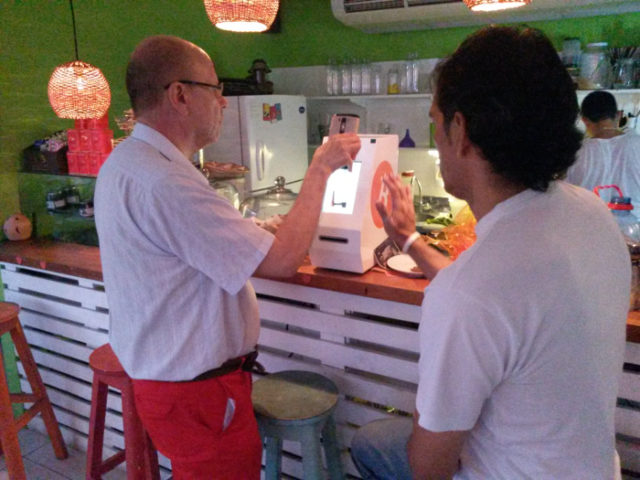How Can I Build Income Overseas? Part II
We are aware that many of our subscribers are retirees with a monthly income. So this may be a subject of no interest for those subscribers. We ourselves are in that category but with all the goings on that we read about in the world, we still think that building additional streams of income is a prudent idea. It is our goal as well.You do need a financial cushion to see you through the transition. Yes there are jobs in South America but for most of them you need to know the language. Not saying you have to be accomplished, but you do usually need to be able to communicate. You can probably do this in about 6 months if you make it your goal and really work at it.
At this writing, there is opportunity. In fact, many salaries in Chile, for example, are close or equal to those in the United States. But, as stated, Spanish is usually necessary.
There are jobs in South America that don’t require Spanish. English as a second Language (ESL) teachers do not need to know Spanish. However, while teaching English does produce an income, it is not high income. I have heard of telemarketing jobs that target English-speaking countries. But in other fields, we’ve also known very qualified people who have gone for interview after interview and were told, “We want to hire you, you are certainly qualified, but you need to learn Spanish first.
There is a number of people who speak English who have found ways to work in our area. One woman works for a real estate company in Texas, and she does it from her home office in Uruguay. It is certain that technology has opened up a lot of opportunity for working anywhere in the world.
Another expat that we know is a stock broker who spends half his time in Uruguay, the other half in Thailand, and he does everything, including contacting clients, from wherever he is, via his computer and Magic Jack. He tells us people don’t even know he isn’t in Texas.
Another expat, who decided to settle in Costa Rica, does social marketing for a U. S. company—from her computer in Costa Rica. She had that job and was working at it before she moved to Central America.
In the case of one family, the husband was an accomplished IT specialist. Uruguay has set the goal of becoming an international IT service center and so the jobs were there for him, except for the problem with the language. He was one of those mentioned above who was told again and again that “We would like to have you, but you would need to be able to speak Spanish.” He and his wife eventually started a home bakery just to pay their expenses. South America has more opportunity for stop gap businesses like that, in our viewpoint, because a family can do that without interference from some government bureaucracy. Not saying that there isn’t bureaucracy, just that it is not as intrusive, generally, as it is in certain other countries. They were able to support their family by selling baked goods in offices. But they ended up returning to the United States to work for the company he had left. They tell us they are still planning to return, this time to Chile. We hope they do. But next time they plan to be better prepared.
As you know, we believe the best opportunity is for entrepreneurs—people who are willing to start and run their own business. Here are examples of what those people are doing successfully:
An expat in Buenos Aires owns—not just one–but seven businesses. Among them is a software development company, a restaurant and a taxi company.
A couple that publishes children’s books. The husband was an illustrator. They started their business while still in the States. They had it up and running and producing income before they moved south.
An expat who operates over 200 web sites for which he receives a good income from Google ads. He has now added writing and selling ebooks.
One young woman, who we featured in Four Flags Journal, first sold advertising via Skype for U.S. magazines. Later she started a business preparing and delivering organic meals to her customer base. When we knew her she had hired a chef for preparation of the meals and a taxi driver to deliver them on delivery day. However, one subscriber notified us that the business appeared to be closed. So we contacted the owner by email. Well here is the story. She fell in love with the “most fantastic chef in the world”—an Argentine—married him, and they were headed to Mexico to open a natural healing center.
Another expat is teaching piano via Skype internet. We wonder how many courses could be taught via Internet. It is possible to teach entire classes–via telephone conference calls. What possibilities!
We have known of some business failures. One man who came to Uruguay started a construction company involving employees, as construction companies usually do. Uruguay and Argentina are both very socialist. There are endless laws about employees. Among them (and this is not necessarily uniform but it will give you an idea) is that in Argentina holidays are regulated. Employers have no choice in the matter. We sincerely think that, if you count weekends, the Argentina employees have as many non-working days in the year as working days. We never know when we go downstairs in Buenos Aires if the stores will all have bars on the windows—indicating yet another holiday. In Uruguay if you let an employee go, you have to give them a month severance pay for every year they worked for you. The man mentioned above who started the construction company closed down because, as he told us, it was difficult to make a profit because of all the government benefits he was required to pay for each employee. He said the taxes for benefits almost equaled the salary he paid them. So it is a good idea to speak to a good lawyer about laws that might affect your business idea. We like businesses that require no employees. There are ways to get around employees, depending on your business—like hiring jobs done on contract. But you need a good attorney to help you get it right.
Other expats have set up their families in our area but are still traveling away to work. Two that we know work in oil fields and return home monthly. Another is an engineer who travels to the United States every month to meet with his employer but otherwise does his work way south of the border at his home in Chile.
If this subject is helpful, let us hear from you. And if you are an expat living outside your home country and you know of interesting ways that other expats are earning money, we’d like for you to let us know that as well. This article is in response to the many inquiries we have received from subscribers who are anxious to join us, but are rightfully concerned about earning a living in our area.
We have decided to suspend our newsletters until we arrive in Chile and begin our next exploration there. We may publish something in the meantime if something important catches our attention, but until then it will be sporadic. However, we will continue to answer email and comments and we invite you to visit Four Flags Journal on Facebook and to comment on this article on the web page. Your comment just might make a difference for someone else. After all, we are all in this together!
————————————————————–
We received this message for our community this week from a subscriber. If you are interested in more information, the web site is included:
Hi Arlean.
Wanted to let you know about an interesting opportunity for your readers… If we were 20 years younger and knew engineering/technology, we would do it!!
We love Amory and Fernando Claude! They are true pioneers. They are the founders and owners of Chepu Adventures. on the west coast of Chiloé Island. Sort of a small paradise! http://www.chepu.cl They left the city (Santiago) and looked for a quiet, isolated getaway!
They started this about 10 years ago and it is a sustainable lodge that has won many awards from around the world. They are pushing 70 and want to retire and move closer to their son and granddaughter (in Valdivia) They are full every year and have to turn away reservations. There is an issue with help… because they are off the beaten track, so whomever might be interested will need to be a family or 2 couples that believe in the sustainable model and are able to troubleshoot the technology that runs the place… They speak English so it is easy for them to communicate with potential buyers.
We have stayed there and the rooms are very comfortable as well as challenging to meet the footprint goals. Educational experience!!. .



Leave a Reply